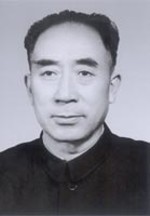Houston Community News >> Bo Yibo, Chinese Revolutionary Dies at 98
1/16/2007 Bo Yibo, Chinese
communist revolutionary and one of the last and most influential of the “Eight
Immortals” who dominated the nation’s politics in the 1980s and early 1990s, has
died at the age of 98.
 In
a one-paragraph report on Tuesday, the official Xinhua news agency said Bo died
on Monday evening of an undisclosed illness.
In
a one-paragraph report on Tuesday, the official Xinhua news agency said Bo died
on Monday evening of an undisclosed illness.
Bo was an “excellent member of the Chinese Communist party, a great warrior for
communism, a remarkable proletarian revolutionary and a brilliant leader of our
party’s economic work”, the agency said.
Bo’s death highlights the disappearance from the political scene of the
individuals who forged the 1949 revolution, but his political legacy survives in
the form of his favoured son Bo Xilai, China’s current minister of commerce.
Bo was one of a select group of powerful veterans centred around late paramount
leader Deng Xiaoping who were informally known as the Eight Immortals for the
vast influence they commanded until gradually succumbing to old age and death in
the 1990s.
By some reckonings Bo was the last immortal to – in Deng’s phrase – “go to meet
Marx”, but he is survived by Wan Li, another former vice-premier widely
considered to have been one of the eight.
Bo’s status was rooted in part in the role he played in China’s revolution. Born
sometime in 1908, he joined the party when just 17. During the 1930s, he was
credited with organising youthful patriots in China’s northern Shanxi province
into a “dare-to-die brigade” that took the fight to the invading Japanese.
After the revolution, Bo became a leading economic official, but like other
relative pragmatists he fell foul of late chairman Mao Zedong during the 1966-76
Cultural Revolution. He was purged as one of the “61 renegades” – party cadres
who had spent time in Kuomintang prisons – and suffered a decade of imprisonment
and humiliation, while his children were jailed or sent into internal exile.
When Deng took power after Mao’s death, Bo was rehabilitated and became one of
China’s most powerful men. As one of the Eight Immortals – a name originally
used for a group of popular Daoist deities and one that was never embraced by
the party – he rubbed shoulders with such power brokers as Deng, economic
planner Chen Yun, and former presidents Yang Shangkun and Li Xiannian.
The immortals were seen as a force for stability in the post-Mao era, and played
a decisive role in the bloody crushing by the army of student-led pro-democracy
protests centred on Beijing’s Tiananmen Square in 1989.
Bo’s son Xilai has won plaudits as a polished and cosmopolitan party official
and commerce minister. However, his rapid rise has underscored the advantages
enjoyed by the offspring of party heavyweights.
(Contributed by FT.com)